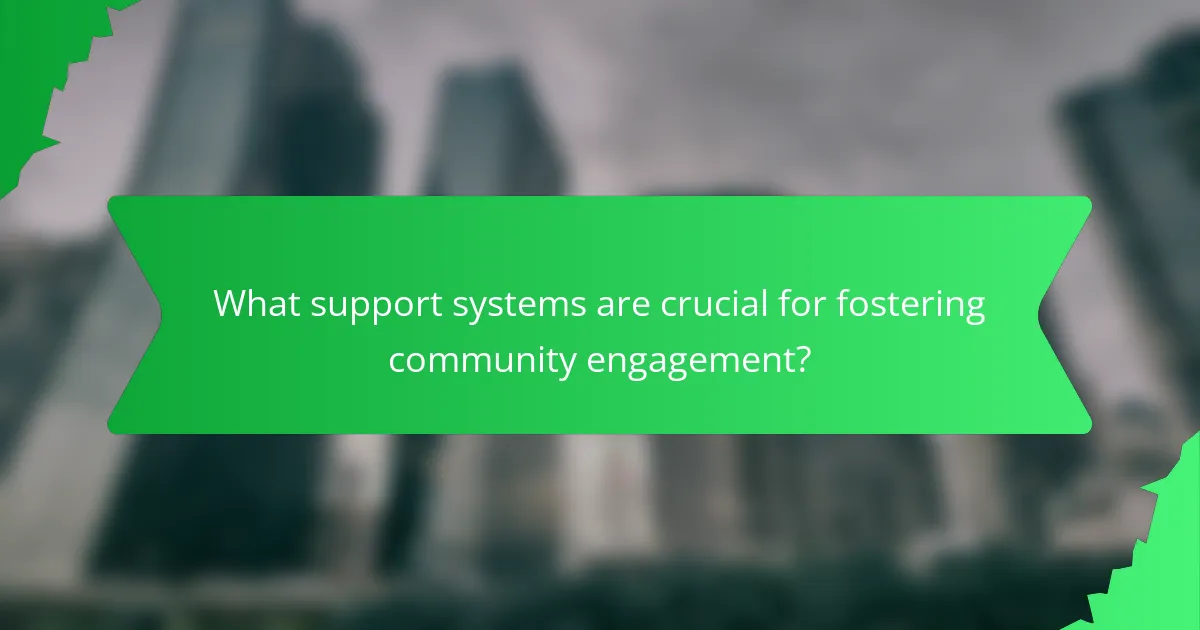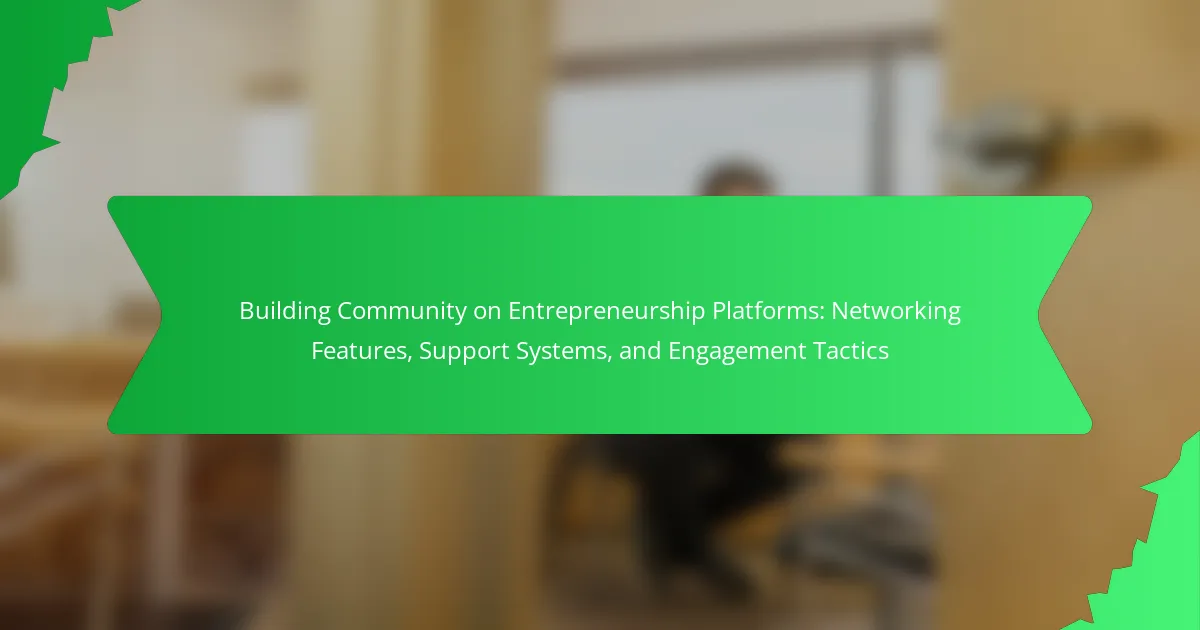Building community on entrepreneurship platforms involves creating a supportive network that facilitates connections among entrepreneurs. Key components include networking features such as discussion forums, direct messaging, and event hosting, which enhance user engagement and collaboration. Additionally, support systems like mentorship programs, communication platforms, and resource accessibility are vital for fostering community engagement. Research indicates that strong community ties contribute to increased business success and innovation, highlighting the importance of these elements in entrepreneurial development. This article explores the various networking features and support systems that enhance community building on entrepreneurship platforms.

What is Building Community on Entrepreneurship Platforms?
Building community on entrepreneurship platforms refers to creating a supportive network for entrepreneurs. This involves facilitating connections among users, sharing resources, and fostering collaboration. Effective communities often include forums, mentorship programs, and networking events. These features enhance engagement and provide essential support for entrepreneurs. Research indicates that strong community ties can lead to increased business success and innovation. For instance, a study by the Kauffman Foundation found that entrepreneurs with robust networks are more likely to secure funding and achieve growth. Thus, building community is crucial for entrepreneurial development.
How do entrepreneurship platforms facilitate community building?
Entrepreneurship platforms facilitate community building by providing networking features, support systems, and engagement tactics. These platforms enable users to connect with like-minded individuals. They often include forums and discussion boards for knowledge sharing. Networking events and webinars allow users to interact in real-time. Support systems, such as mentorship programs, foster deeper connections. Many platforms also offer resources and tools for collaboration. Engagement tactics, like challenges and contests, encourage participation. According to a 2020 study by the Global Entrepreneurship Monitor, community support significantly increases entrepreneurial success rates. Thus, these platforms create environments conducive to building strong entrepreneurial communities.
What are the key features that support community engagement?
Key features that support community engagement include communication tools, event organization, and feedback mechanisms. Communication tools like forums and chat functions enable members to interact easily. Event organization features allow users to plan and participate in community activities. Feedback mechanisms encourage members to share their opinions and suggestions. These features foster a sense of belonging and collaboration. Research shows that engaged communities lead to higher satisfaction and retention rates. Studies indicate that platforms with robust engagement features see a 30% increase in user participation.
How do these features differ across various platforms?
Networking features, support systems, and engagement tactics differ significantly across various entrepreneurship platforms. For instance, LinkedIn emphasizes professional networking with features like endorsements and recommendations. In contrast, platforms like Meetup focus on in-person events and community gatherings. Support systems vary; platforms like Slack offer real-time communication, while forums such as Reddit rely on asynchronous discussions. Engagement tactics also differ; Facebook groups often utilize polls and live videos, while Discord uses voice channels and community roles. These variations cater to different user preferences and community-building strategies.
Why is community important for entrepreneurs?
Community is important for entrepreneurs because it provides essential support and networking opportunities. Entrepreneurs often face challenges that can be mitigated through shared experiences. A strong community fosters collaboration, leading to innovative solutions. Networking within a community can result in valuable partnerships and mentorship. According to a study by the Kauffman Foundation, entrepreneurs with strong networks are more likely to succeed. Additionally, community engagement can enhance visibility and credibility in the market. Access to resources and knowledge sharing within a community accelerates growth and learning. Overall, a supportive community is a critical asset for entrepreneurial success.
What benefits does a strong community provide to entrepreneurs?
A strong community provides entrepreneurs with essential networking opportunities. These connections can lead to partnerships, collaborations, and mentorship. Entrepreneurs often gain access to valuable resources and knowledge through community interactions. Support systems within these communities offer encouragement and advice during challenging times. Additionally, communities can facilitate sharing of best practices and innovative ideas. Research shows that 70% of entrepreneurs credit their networks for business success. This highlights the importance of community in fostering growth and resilience.
How can community impact business growth and innovation?
Community can significantly impact business growth and innovation by providing support, resources, and collaboration opportunities. A strong community fosters networking among entrepreneurs, leading to shared knowledge and experiences. This exchange of ideas can spark innovation and inspire new business models.
Research shows that businesses engaged in community networks experience higher growth rates. According to a study by the Kauffman Foundation, companies with robust community ties grow 2.5 times faster than those without. Communities also offer access to diverse talent and skills, enhancing problem-solving capabilities.
Moreover, communities can facilitate customer feedback, allowing businesses to adapt and innovate based on real-time insights. Engaging with community members can lead to co-creation opportunities, resulting in products and services that better meet market needs. Overall, a vibrant community acts as a catalyst for sustainable business growth and continuous innovation.

What networking features enhance community building on entrepreneurship platforms?
Networking features that enhance community building on entrepreneurship platforms include discussion forums, direct messaging, and event hosting. Discussion forums allow users to share ideas and seek advice, fostering engagement. Direct messaging facilitates one-on-one communication, strengthening connections among members. Event hosting features enable networking opportunities through webinars, meetups, or workshops. These features create a sense of belonging and encourage collaboration. According to a study by the Harvard Business Review, platforms with strong networking features see a 40% increase in user engagement. This data highlights the importance of these features in building vibrant entrepreneurial communities.
How do networking tools foster connections among users?
Networking tools foster connections among users by enabling communication and collaboration. They provide platforms for users to share ideas and resources. Features like messaging, forums, and group discussions enhance interaction. Users can easily connect based on shared interests or goals. Networking tools often include profiles that showcase skills and experiences. This visibility encourages users to reach out to one another. Additionally, tools may offer event features for networking opportunities. Research indicates that active engagement through these tools leads to stronger community ties.
What types of networking tools are commonly available?
Common types of networking tools include social media platforms, professional networking sites, and collaboration software. Social media platforms like Facebook and Twitter facilitate informal networking and community building. Professional networking sites such as LinkedIn focus on career-oriented connections and opportunities. Collaboration software, including tools like Slack and Microsoft Teams, supports communication and project management among teams. These tools enhance networking by providing various channels for interaction and engagement.
How do users leverage these tools to build relationships?
Users leverage networking tools on entrepreneurship platforms to foster connections and build relationships. These tools include messaging systems, forums, and collaborative projects. Messaging systems allow users to communicate directly, facilitating personal interactions. Forums enable discussions around shared interests, helping users find common ground. Collaborative projects encourage teamwork, strengthening bonds through joint efforts. Additionally, users can share resources and knowledge, enhancing mutual support. Research indicates that active engagement in these features leads to stronger professional networks. According to a study by the Harvard Business Review, networking can increase opportunities by 50%.
What role does mentorship play in networking on these platforms?
Mentorship plays a crucial role in networking on entrepreneurship platforms. It facilitates connections between experienced professionals and newcomers. This relationship fosters knowledge sharing and skill development. Mentors offer guidance that can enhance networking opportunities. They introduce mentees to their professional circles. This expands the mentee’s network significantly. According to a study by the Harvard Business Review, mentorship increases the likelihood of career advancement. This highlights the tangible benefits of mentorship in networking contexts.
How can mentorship programs be structured for effectiveness?
Effective mentorship programs should be structured with clear goals, defined roles, and regular evaluation. Establishing specific objectives helps align mentors and mentees on desired outcomes. Pairing mentors and mentees based on skills and interests enhances compatibility. Implementing a structured curriculum or framework guides discussions and activities. Regular check-ins and feedback sessions ensure accountability and progress tracking. Providing resources and training for mentors improves their effectiveness. Evaluating the program’s impact through surveys and metrics allows for continuous improvement. According to the National Mentoring Partnership, structured mentorship programs increase retention rates and participant satisfaction.
What are the outcomes of successful mentorship in entrepreneurial communities?
Successful mentorship in entrepreneurial communities leads to increased business growth and innovation. Mentorship provides entrepreneurs with access to valuable knowledge and experience. This guidance helps mentees avoid common pitfalls and make informed decisions. Successful mentorship also fosters networking opportunities. Entrepreneurs can build relationships that lead to partnerships and collaborations. Furthermore, mentorship enhances confidence and resilience in entrepreneurs. Studies show that mentored entrepreneurs often achieve higher revenue growth. According to a report by the Kauffman Foundation, mentored startups are 70% more likely to survive. This data illustrates the significant impact of mentorship on entrepreneurial success.

What support systems are crucial for fostering community engagement?
Support systems crucial for fostering community engagement include mentorship programs, communication platforms, and resource accessibility. Mentorship programs provide guidance and support from experienced individuals. They enhance skills and knowledge sharing, which strengthens community ties. Communication platforms facilitate interaction among members. They allow for real-time discussions and information exchange. Resource accessibility ensures that community members have the tools they need to succeed. This includes access to training materials, funding opportunities, and networking events. Research shows that communities with strong support systems report higher engagement levels and member satisfaction.
How do support systems contribute to user retention?
Support systems significantly enhance user retention by providing essential assistance and resources. These systems offer guidance, resolve issues, and foster a sense of belonging. Users are more likely to stay engaged when they feel supported. Research indicates that 70% of users value responsive support, which directly correlates with their likelihood to continue using a platform. Additionally, effective support systems can reduce churn rates by addressing user concerns promptly. This proactive approach builds trust and loyalty, encouraging long-term commitment to the platform.
What types of support can platforms provide to entrepreneurs?
Platforms can provide various types of support to entrepreneurs. These include access to funding opportunities, mentorship programs, and networking events. Funding opportunities may consist of grants, loans, or investment connections. Mentorship programs often pair entrepreneurs with experienced business leaders for guidance. Networking events facilitate connections among entrepreneurs, investors, and industry experts. Additionally, platforms may offer educational resources, such as webinars and workshops. These resources help entrepreneurs develop essential skills and knowledge. Community forums also provide a space for sharing experiences and advice. Overall, platforms play a crucial role in fostering entrepreneurial success through diverse support mechanisms.
How do these support systems vary by platform?
Support systems vary significantly by platform in entrepreneurship communities. Each platform offers different features and resources tailored to user needs. For instance, some platforms prioritize mentorship programs, connecting users with experienced entrepreneurs. Others may focus on peer-to-peer support, facilitating collaboration among users.
Social media platforms often provide informal support through groups and forums. In contrast, dedicated entrepreneurship platforms may offer structured resources like webinars and workshops. Additionally, some platforms include integrated tools for project management and feedback, enhancing user engagement.
Research indicates that platforms with robust support systems see higher user satisfaction and retention rates. According to a study by Startup Genome, effective support networks can increase startup success by up to 70%.
What resources are essential for community members?
Essential resources for community members include networking opportunities, educational materials, and support systems. Networking opportunities facilitate connections among members, promoting collaboration and idea exchange. Educational materials provide knowledge and skills essential for entrepreneurship. Support systems, such as mentorship programs and forums, offer guidance and assistance. These resources enhance engagement and foster a thriving community. Research shows that strong networks can increase business success rates significantly.
How do educational resources enhance community involvement?
Educational resources enhance community involvement by providing knowledge and skills to individuals. They empower community members to engage effectively in local initiatives. Access to workshops, seminars, and online courses fosters collaboration among participants. Educational resources also promote awareness of community issues and opportunities. For example, programs on entrepreneurship can encourage local business development. This leads to increased participation in community events and projects. Furthermore, informed individuals are more likely to contribute their time and resources. Research shows that communities with strong educational programs experience higher levels of civic engagement.
What role do forums and discussion groups play in support systems?
Forums and discussion groups serve as vital components in support systems. They provide a platform for individuals to share experiences and seek advice. Participants can ask questions and receive feedback from peers. This interaction fosters a sense of community and belonging. Research indicates that social support significantly enhances emotional well-being. A study published in the Journal of Community Psychology found that online forums can effectively reduce feelings of isolation. Additionally, these platforms allow for the exchange of resources and knowledge. Members can access diverse perspectives that contribute to problem-solving. Thus, forums and discussion groups play a crucial role in enhancing support networks.
How can platforms measure the success of their community-building efforts?
Platforms can measure the success of their community-building efforts through various metrics. Key performance indicators (KPIs) include user engagement rates, such as active participation in discussions and events. Tracking the growth of membership over time provides insight into community appeal. Analyzing user retention rates helps assess satisfaction and loyalty. Additionally, platforms can evaluate feedback through surveys to gauge member satisfaction. Interaction frequency, like comments and shares, indicates community vibrancy. Monitoring the number of collaborations or partnerships formed within the community reflects its effectiveness. Lastly, measuring the impact of community-driven initiatives on user success stories validates the community’s value.
What metrics are most effective for evaluating community engagement?
The most effective metrics for evaluating community engagement include participation rates, content interaction, and feedback scores. Participation rates measure the number of active members engaging in discussions or events. Content interaction assesses likes, shares, and comments on posts. Feedback scores evaluate member satisfaction through surveys. These metrics provide quantifiable insights into community dynamics. For instance, a study by the Community Roundtable found that organizations with high participation rates see a 50% increase in member satisfaction. This data reinforces the importance of tracking these metrics for effective community engagement evaluation.
How can feedback from community members improve support systems?
Feedback from community members can enhance support systems by identifying specific needs and areas for improvement. When community members share their experiences, it highlights gaps in existing support services. This information allows organizations to tailor their resources more effectively. For instance, surveys and discussions can reveal common challenges faced by users. Addressing these challenges can lead to more relevant and timely assistance. Additionally, positive feedback can reinforce effective strategies and practices. By continuously integrating community feedback, support systems can evolve and remain responsive to user needs. Research shows that organizations utilizing member feedback report higher satisfaction and engagement levels.
What are effective engagement tactics for entrepreneurship platforms?
Effective engagement tactics for entrepreneurship platforms include interactive content, community forums, and mentorship programs. Interactive content such as polls and quizzes encourages user participation. Community forums allow users to share experiences and ask questions, fostering a sense of belonging. Mentorship programs connect experienced entrepreneurs with newcomers, providing guidance and support. Regular webinars and workshops enhance learning opportunities and keep users engaged. Gamification elements, like badges or leaderboards, motivate users to participate actively. Personalized communication through newsletters and updates keeps users informed and involved. These tactics have been shown to increase user retention and satisfaction on entrepreneurship platforms.
How can platforms create interactive experiences for users?
Platforms can create interactive experiences for users by incorporating gamification elements. Gamification encourages user participation through rewards and challenges. It can include points, badges, or leaderboards to motivate users. Additionally, platforms can implement real-time chat features for instant communication. This fosters community engagement and allows for immediate feedback. User-generated content is another effective method. It empowers users to share their insights and experiences. Surveys and polls can also enhance interactivity by soliciting user opinions. These methods collectively boost user engagement and satisfaction.
What role do events and challenges play in community engagement?
Events and challenges are crucial for fostering community engagement. They provide structured opportunities for members to interact and collaborate. These activities create a sense of belonging among participants. Engaging in events allows individuals to share knowledge and skills. Challenges often motivate members to achieve common goals. This collective effort enhances community cohesion. Research indicates that participation in community events increases member retention. For example, a study by the National Endowment for the Arts found that community events boost social connections and increase participation in civic activities.
What best practices can platforms adopt to enhance community building?
Platforms can enhance community building by fostering engagement through interactive features. Implementing forums and discussion boards encourages members to share ideas. Regularly hosting webinars or live Q&A sessions creates opportunities for direct interaction. Offering mentorship programs connects experienced entrepreneurs with newcomers. Providing resources like articles and toolkits supports knowledge sharing. Encouraging user-generated content fosters a sense of ownership among members. Utilizing feedback mechanisms helps platforms adapt to community needs. Lastly, recognizing and celebrating member achievements strengthens community bonds.
How can platforms encourage active participation among members?
Platforms can encourage active participation among members by implementing interactive features and fostering a sense of community. Engaging tools such as polls, discussions, and Q&A sessions promote member interaction. Regularly scheduled events, like webinars or meetups, can further enhance participation. Incentives, such as rewards for contributions, motivate members to engage. Feedback mechanisms allow members to share their thoughts, enhancing their connection to the platform. Research indicates that platforms with strong community engagement strategies see higher member retention rates. For example, a study by the Community Roundtable found that organizations with engaged communities reported 50% higher member satisfaction.
What strategies can be implemented to maintain a vibrant community?
Implementing regular events and activities fosters engagement within a community. These can include workshops, webinars, and networking sessions. Encouraging member participation in planning these events increases ownership and involvement. Providing a platform for members to share their successes and challenges builds connection. Establishing clear communication channels enhances transparency and trust. Offering resources and support tailored to community needs strengthens member commitment. Recognizing and celebrating member contributions boosts morale and motivation. Lastly, gathering feedback regularly helps adapt strategies to evolving community dynamics.
Building community on entrepreneurship platforms involves creating supportive networks for entrepreneurs through features like networking tools, mentorship programs, and engagement tactics. The article explores how these platforms facilitate community building, the key features that enhance engagement, and the importance of community for entrepreneurial success. It also examines the role of mentorship and support systems, the impact of community on business growth and innovation, and effective strategies for maintaining vibrant communities. Overall, the content emphasizes the critical role of community in fostering collaboration, resource sharing, and networking opportunities for entrepreneurs.
